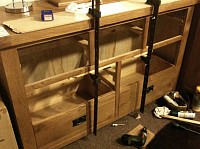Structural Repairs
If it's possible,take a photo of the problem. Emailing a picture is usually the simplest way to describe it. Although I can't always tell without actually seeing it, at least I can get some idea if it is fixable and
how long it would be likely to take.
If something has broken, keep all the bits. If they are still together,keep them in place with a bit of tape. Broken joints can be awkward to repair particularly if the surrounding joints are still firm. Generally, it is better to glue
and clamp if possible and brace with a concealed bracket if required.
Chairs are among the most stressed pieces of furniture. They often have a hard life, being tilted, stood on and generally abused. One loose joint will lead to another and eventually a rebuild will be needed. Pine chairs tend to suffer more than
most, as the softer wood compresses in the joint.
Bulky items like tables and beds are sometimes damaged accidentally by being dragged instead of lifted. This tends to over stress fixings. That kind of damage is usually fixable. If you need to move heavy furniture on your own, it's generally
best to do it in small stages and changing sides so as to spread the pressure.
Drawers will wear over time, wooden runners create friction and wear more where they contact most. For drawers which run on the bottom, this is typically at the back of the drawer runner and the front of the cabinet runner. Side hung drawers
tend to slip off one side and jam when worn. If you want to prevent wear on wooden runners, use soft beeswax just on the runners inside the cabinet. This will reduce the friction, making them smoother running and longer lasting. If they are already a problem, however, don't wax them until they've been repaired. At this stage, wax makes matters worse and makes the repair more difficult.

